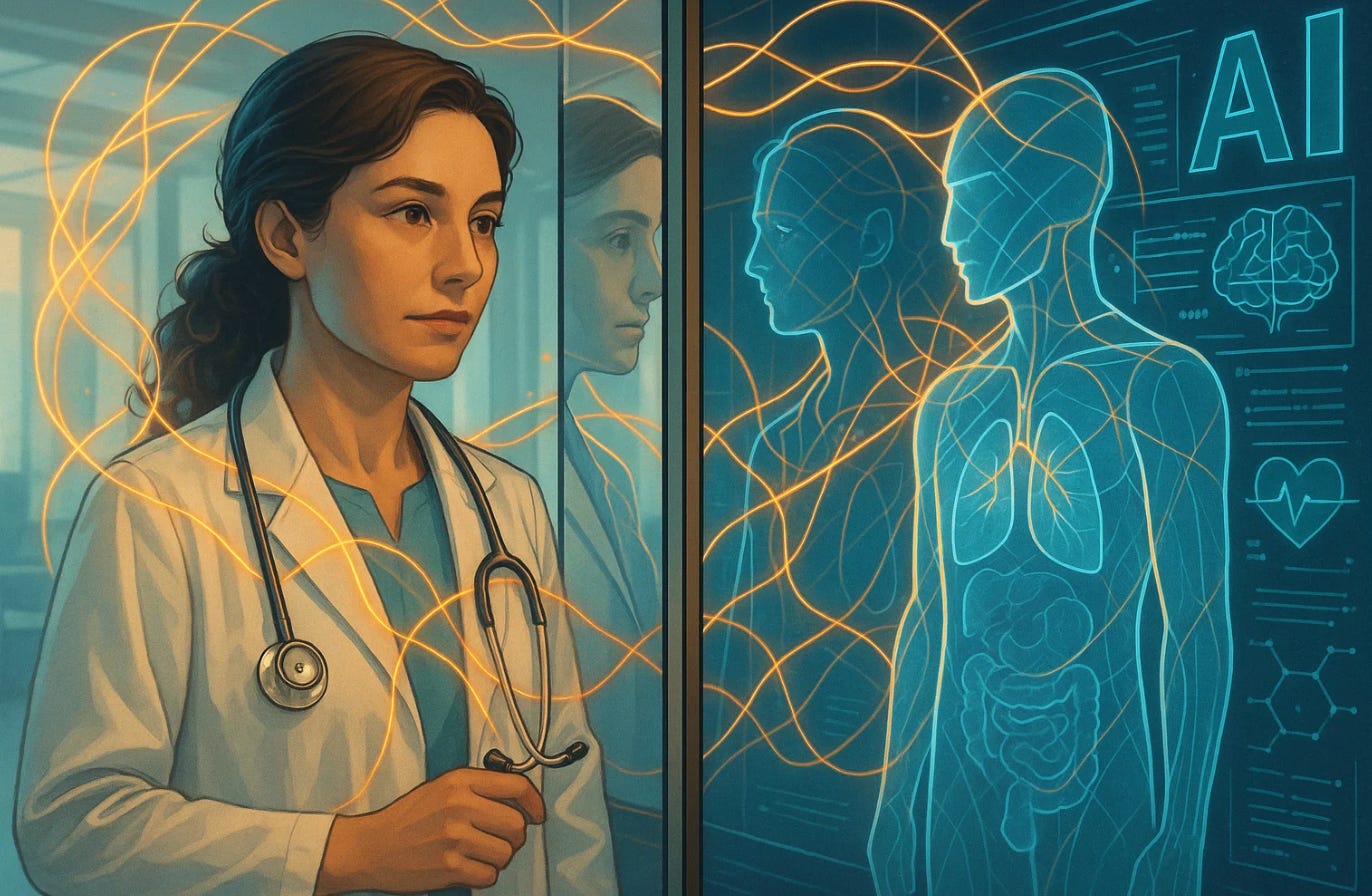The Wrong Scapegoat: Why Blaming AI Won’t Fix Medicine’s Accountability Crisis
The real danger isn’t artificial intelligence—it’s our refusal to confront human error in a system that’s been failing patients for decades. The Responsibility Clause.
When The Guardian warns that AI could “make it harder to establish blame for medical failings,” it strikes a nerve in medicine. The article quotes experts worrying that artificial intelligence might complicate lawsuits or make it difficult to determine who is at fault when something goes wrong. But step back for a moment: do we really think medicine today has mastered accountability?
Medical errors already kill over 250,000 Americans every year—9.5% of all deaths—making them the third leading cause of death.
These are not hypothetical risks. They are real, human, and persistent. Made by humans. Yet most of these errors go unreported, unpunished, and unlearned. With AI so prevalent, where are all the deaths caused by AI? The uncomfortable truth is that we have tolerated catastrophic human errors at epidemic levels for decades without any algorithmic assistance.
The big question is: Can AI prevent these errors?
The Old Problem in a New Disguise
The Guardian article highlights genuine challenges—liability, transparency, and legal uncertainty around AI systems. But those issues aren’t unique to AI. They are symptoms of a profession that has long struggled to balance innovation, responsibility, and self-scrutiny.
When a physician misreads an X-ray, prescribes the wrong drug, or misses a diagnosis, we call it “human error.” When an AI model misclassifies an image, suddenly it’s “machine failure.” Yet in both cases, the physician remains the final decision-maker. The algorithm is not a scapegoat. It is a tool. Blaming AI for poor outcomes is like blaming the stethoscope for a missed murmur.
The Real Accountability Crisis
If we are honest, medicine has never had a coherent system for accountability. Peer review is often opaque. Reporting systems are underused. Lawsuits target individuals rather than systems. Hospitals protect reputations before patients. And even the most tragic errors are quietly written off as “complications.”
AI doesn’t threaten accountability—it exposes how little of it we’ve ever had. It records every click, every input, every output. It timestamps decisions and preserves them for audit. Unlike human memory, it doesn’t forget or distort. Properly implemented, AI creates an indelible trail of responsibility.
The Physician’s Duty Remains
Some physicians worry that AI could “blur the lines” of moral and legal responsibility. That anxiety misunderstands professional ethics. The duty to evaluate evidence, to apply clinical judgment, and to obtain informed consent remains with the physician. AI can suggest; it cannot decide.
Imagine a surgeon refusing to operate because a scalpel might slip. The risk lies not in the instrument, but in its misuse. The same applies to AI. A responsible clinician uses it as an extension of expertise—not as an abdication of it.
Why This Debate Feels So Uncomfortable
The resistance to AI often masks a deeper unease: fear of exposure. AI systems can highlight patterns of inconsistency, bias, and error that medicine has long hidden behind professional mystique. If an algorithm reveals that one hospital has twice the rate of hemorrhage mismanagement as another, that’s not a liability problem—it’s a truth problem.
In this sense, AI is not the end of accountability; it may be its beginning. For the first time, we can measure performance objectively, compare across institutions, and identify preventable harm with data rather than anecdotes.
Lessons from Other Fields
Aviation, nuclear power, and manufacturing all faced similar fears when automation arrived. Each initially blamed machines for failures that were, in fact, human. But over time, they learned that technology can make complex systems safer when paired with disciplined human oversight. Pilots still fly planes, but they also monitor algorithms designed to prevent catastrophe. The lesson is not to fear automation, but to integrate it responsibly.
Medicine lags behind because it still clings to the myth of the “heroic” clinician whose intuition outranks data. Yet intuition kills when it replaces evidence. Algorithms don’t remove the art of medicine; they restore its honesty.
The Ethical Imperative
Ethically, the question is simple: if a tool demonstrably reduces diagnostic errors, can we justify refusing it because we fear blame? To reject a safety-enhancing system on that basis borders on moral negligence. Physicians are obligated to use tools that improve patient outcomes, not preserve personal comfort.
Transparency is not a threat to professionalism; it is its foundation. The ethical physician welcomes data that challenge assumptions, because truth—not ego—is what saves lives.
Building a New Culture of Responsibility
To use AI responsibly, medicine must redefine accountability itself. That means:
Clear documentation: Every AI-assisted decision should include who approved it and why.
Independent oversight: Regulators must evaluate AI tools for effectiveness and bias, just as we do for drugs.
Shared liability frameworks: Hospitals, vendors, and clinicians must jointly own outcomes, not hide behind contracts.
Patient education: Patients should understand that AI augments human care, not replaces it.
If implemented ethically, AI could do more to prevent harm than any malpractice reform ever has.
Reflection
Medicine’s biggest ethical challenge is not how to punish failure, but how to prevent it. Artificial intelligence does not erase human responsibility; it amplifies it. The doctor’s judgment still decides, the doctor’s compassion still heals, and the doctor’s accountability still stands. The question is whether we will use this new mirror to confront our own errors—or to keep looking for someone else to blame.



